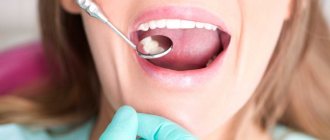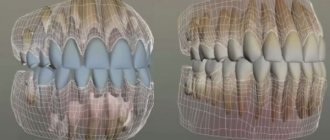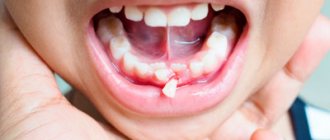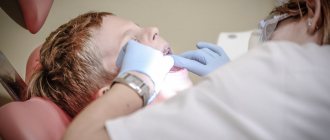If you take care of your teeth, they will always have an attractive appearance. If the teeth are healthy, then they allow their owner to bite and chew food without pain. Only teeth that a person takes care of will always allow him to be in comfort. Therefore, people consistently brush their teeth and visit dentists. However, no matter how high-quality dental care is carried out, at one moment a person may feel severe pain if he eats a cold or hot dish. If this happens, then there is a possibility that the teeth suffer from hyperesthesia - high sensitivity to external factors. The reason may be the destruction of the enamel. If pain occurs from sudden temperature changes, then this indicates 1 degree of hyperesthesia. You need to visit a dental clinic as soon as possible before the problem gets worse. The dentist will quickly find the causes of the problem, and then eliminate these causes.
What is hyperesthesia?
Hyperesthesia is an extreme sensitivity to external stimuli, such as sudden temperature changes, chemical exposure or ordinary touch. Such irritating factors can lead to short-term but severe pain. At the first stage, the teeth react to the temperature of the food, but later pain also arises from simply touching the tongue or exposure to certain substances. There is short-term pain that goes away quickly. Sometimes it doesn’t go away until 10-30 seconds.
If the tooth structure is so damaged that the nerve endings are exposed, then the person will experience pain from simply touching the area with a tongue or finger. Tooth enamel is the most durable tissue in the human body. It allows you to protect dentin from any external irritants. If the enamel is damaged, then any external factors will cause severe discomfort. If the dentin seal is broken, even the lightest touch will cause severe pain.
Special studies have been conducted that have shown that every third person suffers from hyperesthesia in the modern world, regardless of their location, social status or lifestyle. However, statistics have shown that women are more likely to suffer from this disease than the male population.
Diagnostics
If a patient complains of tooth sensitivity to cold, hot, sweet and sour foods, the doctor may immediately suspect hyperesthesia. The disease can be diagnosed after a visual examination of the patient's oral cavity. During the examination, the doctor may note changes in the structure of the hard tissues of the tooth, as well as changes in the condition of the periodontium. Usually there is a decrease in hard tissue at the cutting edge (front teeth) or on the chewing surface (back teeth).
Differential diagnosis of hyperesthesia lies in the ability to distinguish the symptoms of tooth sensitivity from the symptoms of acute pulpitis. In acute pulpitis, pain is prolonged, pain occurs mainly at night. With hyperesthesia, the pain is short-term, occurs directly from chemical or thermal irritation of the tooth and goes away almost immediately.
How to protect teeth from hyperesthesia?
Many people believe that it is enough to brush their teeth twice or thrice a day, and they will always be fine. However, this is a common misconception! If you brush your teeth incorrectly, they will not only not become stronger, but, on the contrary, they can be seriously harmed. For example, a high abrasive content in toothpaste will cause the enamel to become thinner.
The best solution would be to buy a fluoride-containing paste that has a medium level of abrasiveness. During the research, it was possible to identify why this disease occurs less often in men. The fact is that due to stress, the functioning of the gastrointestinal tract is seriously deteriorated. Because of this, the acidity of the oral cavity changes. Due to frequent exposure to acid, they become highly sensitive to irritants, which results in severe pain that causes a lot of discomfort.
To avoid hyperesthesia, you need to brush your teeth every day and try as much as possible to protect yourself from stress.
Provoking factors for the development of dental hypersensitivity
Most often, increased sensitivity is a consequence of a violation of the integrity of the enamel or destruction of the hard tissues of the teeth, which increases the risk of irritation of the endings of the nerve fibers.
The key provocateurs are caries lesions, exposure of the necks and roots of the teeth. Hyperesthesia is diagnosed as a sign of a number of non-carious lesions - enamel defects, progressive loss of enamel and dentin with a decrease in crown height, local destruction, acid necrosis, traumatic injuries, periodontitis with an aggressive course, metabolic disorders of the body, endocrine diseases, mental disorders.
The disease can also occur when consuming large quantities of acidic foods and drinks. Under the influence of acids, the enamel softens and loosens, and erosion appears on its surface.
Increased sensitivity of teeth can be observed after removal of hard dental tissues in order to create a prosthetic space for metal-ceramic structures.
One of the provoking factors is bleaching, during which aggressive chemical bleaching agents are used.
The most common provoking factors also include:
- pulpitis, other dental diseases or pathological conditions that cause destruction of tooth enamel;
- disruptions in the body caused by uncontrolled use of hormonal drugs;
- stress;
- chronic gastrointestinal diseases;
- malocclusion;
- incorrectly selected hygiene products (hard bristled brushes, highly abrasive paste);
- bad habits.
Toothache caused by hot and cold foods
If your teeth respond with a painful reaction when eating such dishes, this means that the problem lies in the enamel of the teeth. When the enamel is healthy, the tooth structure is reliably protected from sudden temperature changes. If your teeth respond with pain when you eat, you should immediately visit a dentist to identify the cause. Here are a few reasons that cause such pain:
- Tissue inflammation has occurred;
- The structure in the enamel is damaged;
- Non-carious lesions;
- Cracks have appeared;
- Due to severe stress, the enamel has become thinner.
By the way, it happens that such pains are caused by the endocrine system or they may be caused by a stomach disease. It is necessary to reconsider your eating habits. It is necessary to reduce the consumption of foods with too high and low temperatures, and also be careful when drinking sour juices. To do this, you should use a straw.
Hypersensitivity after tooth filling and preparation for dentures
Most often in dental practice, increased sensitivity is observed after filling. Patients come to the clinic with complaints of sensitivity, especially to cold, without precise localization of pain. Upon visual examination, sensitivity in the basal part is not detected. There is no evidence of open pulp or caries on the x-ray.
The causal unit, however, can be identified. To do this, use ice, which, wrapped in a paper napkin, is applied to the cheek area or to the surface of the tongue. An area with a violation of integrity in hard tissues is a source of irritation, so severe pain occurs in the tooth. Removing all filling material will allow you to detect the break.
The reason for increased susceptibility, often to cold or too hot food, may be the appearance of microgaps between the filling and the hard tissues of the tooth due to compression of the composite material. The gap formed in the cavity near the root canals opens up space for the movement of dentinal fluid, thereby causing a response from the nerve endings of the pulp.
The area of contact of the material with the walls of the internal space of the tooth can also contribute to the formation of hypersensitivity after filling. Since filling composites have a high elasticity index, they cause stress in the contact layer “filling - hard dental tissue”. The tension in the tooth tissues is greater in cases where the surface of the restoration in contact with the walls is extensive.
After preparation (grinding) of a tooth for prosthetic structures and microprostheses, normal sensitivity is observed, which is characterized by mild pain. If there is no inflammatory process in the pulp, the pain is considered causative and disappears a few minutes after the drill stops working. If hypersensitivity persists for a long time (2 or more days after the procedure), treatment of pulpitis is required.
Hyperesthesia after visiting the dentist
You should only visit reliable dental clinics. If the doctor does not have the proper skills and professionalism, then hyperesthesia may occur due to his actions. Most often the disease appears due to the following procedures:
- Cleaning and whitening of the dental cavity;
- Filling with photopolymerization procedure;
- Acid etching.
After any bleaching, special enamel protection must be carried out. If, after teeth whitening, pain is felt when eating foods with high and low temperatures, this means that the procedure was not carried out or was not performed as it should.
After the operation, the filled tooth became very sensitive to food with high and low temperatures, this may mean:
- Some inflamed tissue was never eliminated;
- Tissue inflammation has occurred;
- The doctor did not follow the technology, so the integrity of the seal was damaged during the installation process;
- The filling material irritates the tissue due to individual intolerance;
- There is an air bubble under the filling.
Unfortunately, in almost all of the above cases, the pain will not go away, but will get worse. When the pulp overheats, pulpitis can develop, which will lead to damage to other tissues. If your teeth react strongly to temperature changes for a long time, then you need to solve this problem as soon as possible.
As for tooth depulpation, it is normal if after the procedure the tooth reacts sharply to cold and hot food. If after some time the pain still remains, then you need to go to the dental clinic, because there is a possibility that the tooth was not fully treated.
Treatment at home
Visiting the clinic is a prerequisite for quality therapy. If it is not possible to see a doctor, you can temporarily turn to folk remedies. The following show the greatest effectiveness:
- Infusions and decoctions of herbs. Rinsing allows you to cope with the manifestations of the inflammatory process, kills bacteria, relieves swelling, and promotes rapid healing.
- Propolis. The most effective are rinses with an alcohol tincture based on this substance. However, it is important to remember that such manipulations are only allowed for adult patients. They are contraindicated for children.
- Warm milk. It is worth drinking it warm as often as possible, holding it in your mouth for a short time. Dairy products contain calcium, which has a beneficial effect on the condition of enamel.
It is recommended to use special gels and rinses designed to clean sensitive incisors, canines and molars. They contain fluoride.
But you can’t rely solely on home treatments. They can only be an addition to complex drug therapy. Even if the unpleasant symptoms have disappeared, you should not neglect a visit to the doctor.
Choosing toothpaste
When deciding what to do when teeth become sensitive to cold and hot, the dentist will first of all recommend to the patient special products for daily cleaning. Bleaching compounds should be completely abandoned, even if they do not contain abrasives.
Let's look at what you need to pay attention to when purchasing:
- Stick only to specialized paste-like and gel-like preparations. Most manufacturers put a special mark on the packaging about the purpose of the product.
- At the pharmacy you can additionally purchase medications that reduce sensitivity.
- The more fluoride a product contains, the better in this situation. The substance has a positive effect on the condition of the enamel. The hard outer layer of the units is restored, they cease to hurt and respond to stimuli.
The brush should also be suitable. Medium-hard bristles are the best option for high-quality cleaning and preventing surface scratching. But before purchasing any hygiene items, it is better to consult a doctor.
How to avoid hyperesthesia
To avoid hyperesthesia, you need to regularly take care of your tooth enamel. Here are a few simple rules that will help keep your enamel healthy:
- Brush your teeth every day with fluoride toothpaste. But you should avoid pastes that contain abrasives;
- To brush your teeth, you should choose a brush with medium hardness. You need to brush your teeth thoroughly, but without being too harsh;
- Be sure to eat foods that contain calcium and phosphorus. But you need to eat less sweets;
- Avoid eating very hot or cold foods. If you drink a hot drink, you should avoid getting it on your teeth.
If you have toothaches, you need to visit a qualified dentist so that he can find out the causes and then eliminate them. If everything is fine with your teeth, you should still go to the dental clinic once every six months for preventative care. If your teeth are in order, then going to the dental clinic will be a simple, pleasant walk.
Symptoms
The main symptom of tooth enamel hyperesthesia is acute short-term pain. Usually the patient complains that the tooth feels cold, sweet, hot, sour, and begins to hurt. In this case, the pain is short-lived; literally after a few seconds the pain subsides and the tooth stops hurting. The intensity of toothache can range from mild discomfort to very severe throbbing pain. In some particularly difficult cases, patients cannot even breathe in cold air and only take warm, neutral-tasting food.
Typically, pain during hyperesthesia is a constant symptom, but sometimes temporary periods of remission are observed when the teeth do not respond to stimuli at all or the intensity of pain is significantly reduced.
How exactly does pain occur?
To understand the mechanism of pain when eating cold or hot food, it is enough to remember the structure of the tooth. We call the topmost, visible layer enamel. This is the most durable tissue of the human body, which reliably protects the more sensitive tooth tissues from any irritants, including thermal ones.
But if you neglect your health or due to chronic diseases, the enamel becomes thinner, exposing dentin. It, in turn, is permeated through and through with hollow tubules, which begin at the pulp itself. And without a barrier in the form of durable enamel, irritants: cold air, cold and hot drinks easily pass through the tubules of the dentin and begin to directly affect the nerve endings. The patient experiences a sharp attack of pain.
Elimination of tooth sensitivity
Using ultrasound, the doctor removes soft and hard deposits from the teeth. After removing plaque, teeth become more sensitive for a short time, so remineralization or deep fluoridation is immediately carried out. During remineralization, the enamel is treated with active compounds of calcium and phosphates. Deep fluoridation – coating with sodium fluoride. Both procedures significantly strengthen the enamel's resistance to irritants.
The doctor uses agents that reduce the movement of fluid in the dentinal tubules. It “seals” them using desensitizers or reduces their volume through remineralization. Protecting exposed dentin reduces the force of transmission of the irritant impulse from the enamel to the nerve.
Consultation with a dentist
When the first signs of sensitivity appear, you should immediately make an appointment with the dentist. The doctor will determine the cause, prescribe appropriate therapy and advise on oral care issues. The main thing is not to let the disease progress. Timely treated caries will not lead to complications. Detailed information can be found here: treatment of initial caries.
In addition to therapy, the dentist prescribes medications and prescribes procedures. Oral hygiene and high-quality balanced nutrition are of great importance. The first-priority procedure that is performed on a patient with a high degree of sensitivity of units is the removal of solid deposits. Ultrasonic cleaning has performed well in this regard. It also strengthens the soft gum tissue.
Using a special paste, the teeth are covered with a thin film, which protects them from the external aggressive environment. Today, the device is actively used for gum massage. This is an irrigation device where rubber bristles are used instead of classic bristles. It also washes away food residues with a stream of water. Vitamin complexes are prescribed to strengthen the immune system, which accelerates the healing of inflamed areas and strengthens the tissues of the oral cavity. Follow the link Dental treatment in St. Petersburg and sign up at the ARTE-S clinic. The sooner the problem is identified, the easier and cheaper the therapy will be!
Sensitivity of teeth. Stages of treatment
- Eliminate the cause of hyperesthesia: get rid of plaque, deposits, stones, caries, wedge-shaped defects.
- Carry out professional oral hygiene.
- Strengthen the enamel with calcium and fluoride.
- Teach the patient how to use a toothbrush and floss correctly.
- Choose suitable dental care products: toothpaste, mouthwash.
Table 2. Tooth sensitivity: causes and how to treat
| № | Cause | What to do |
| 1. | Soft coating. | Careful hygiene with home remedies. |
| 2. | Hard coating. | Professional hygiene in dentistry. |
| 3. | Caries in the white spot stage. | Deep fluoridation, remineralization. |
| 4. | Caries, pulpitis, periodontitis. | Dental treatment. |
| 5. | Exposure of the cervical part, wedge-shaped defect. | |
| 6. | Malocclusion. | Orthodontic therapy. |
What to do if your teeth begin to react to heat?
The first manifestations of hyperesthesia are barely noticeable and fleeting. At first, the sensation can hardly be called pain; rather, it is a slight discomfort that can easily be avoided by giving up the habit of drinking scalding tea or coffee. But it’s better to consult a dentist. The doctor will assess the condition of the enamel, identify the cause of increased sensitivity and prescribe treatment that is suitable for you.
Treatment at home
For increased sensitivity of teeth to hot foods and drinks, traditional medicine recommends using clove and tea tree oils. They can be used to lubricate a problematic tooth without diluting. Or add 3-4 drops to a glass of warm water and rinse your mouth with the solution several times a day.
Well-chosen toothpastes give a good effect:
- Lacalut Sensitive;
- Sensodyne Repair & Protect;
- SPLAT "Biocalcium";
- Aqua Oxygen Mineral Cocktail.
They contain special components that fill microcracks, and sometimes long-acting anesthetics. Of course, toothpastes cannot cure enamel erosion, cope with increased abrasion and other dental problems. But if the enamel has not yet become too thin, they will help you survive an unfavorable period (pregnancy, spring vitamin deficiency, stressful situations) with minimal losses.
Toothpastes for sensitive teeth can be used for more than just brushing. You can simply lubricate your teeth with them to quickly relieve pain.
Treatment in dentistry
A doctor has many ways to overcome hyperesthesia. First of all, the dentist will try to identify the problem of his profile: periodontal disease, caries, non-carious enamel lesions. If there are any, the patient will have to treat the detected pathologies.
If the teeth are healthy, and the patient complains of pain from hot foods, the dentist will recommend contacting a therapist, and then specialists to identify the causes of the problem. And to improve the quality of life, it will seal the dentinal tubules with remineralizing agents, sealants, and desensitizers.
Treatment at home
For increased sensitivity of teeth to hot foods and drinks, traditional medicine recommends using clove and tea tree oils. They can be used to lubricate a problematic tooth without diluting. Or add 3-4 drops to a glass of warm water and rinse your mouth with the solution several times a day.
- Lacalut Sensitive;
- Sensodyne Repair & Protect;
- SPLAT "Biocalcium";
- Aqua Oxygen Mineral Cocktail.
They contain special components that fill microcracks, and sometimes long-acting anesthetics. Of course, toothpastes cannot cure enamel erosion, cope with increased abrasion and other dental problems. But if the enamel has not yet become too thin, they will help you survive an unfavorable period (pregnancy, spring vitamin deficiency, stressful situations) with minimal losses.
Toothpastes for sensitive teeth can be used for more than just brushing. You can simply lubricate your teeth with them to quickly relieve pain.
What you need to know about remineralization therapy
The goal of this treatment is to increase calcium levels. To do this, tooth enamel is treated with special preparations, after which exposure to fluoride substances is carried out.
One of the best treatments for hypersensitivity is Tiefenfluorid, a two-component enamel-sealing liquid:
- Component 1 - highly active calcium hydroxide
- Component 2 - highly active fluorine
Treatment involves sequential treatment of tooth enamel with both components of the drug; It is recommended to carry out a couple of procedures with a short break.
Important! The use of the drug Tiefenfluorid and others like it is effective only if all teeth have been treated for caries and do not have mechanical defects (wedge-shaped, etc.). All dental problems must be eliminated before treatment with an enamel-sealing liquid.










